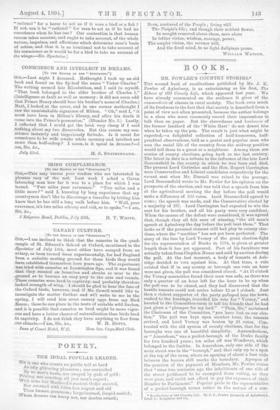CANARY CULTURE.
[To THE EDITOR OP THE "SPECTATOR."] SIR,—I am inclined to think that the canaries in the quad- Tangle of St. Edward's School at Oxford, mentioned in the Spectator of July 14th, must either have escaped from an .aviary, or been turned loose experimentally, for had England been a suitable nesting ground for these birds they would 'have established themselves here years ago. The experiment .was tried with canaries at Leamington Spa, and it was found that they roosted on branches and shrubs so near to the ground as to become an easy prey to the cats and vermin. These canaries were bred in captivity, and probably therefore lacked strength of wing. I should be glad to hear the fate of the Oxford birds, however, and if Mr. Cowell would like to investigate the matter further and will write to me in the -spring, I will send him some canary eggs from my Bird Room; these he can place in the nests of suitable wild finches, and it is possible that canaries so bred might be more vigor- 'OAS and have a better chance of naturalisation than birds bred in captivity. I do not think they have anything to fear from our olimate.—I am, Sir, &c., W. H. BETTS,


































 Previous page
Previous page